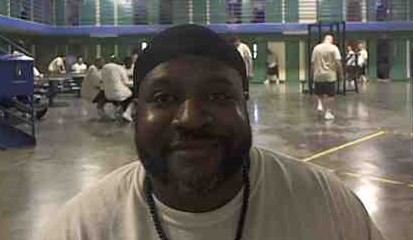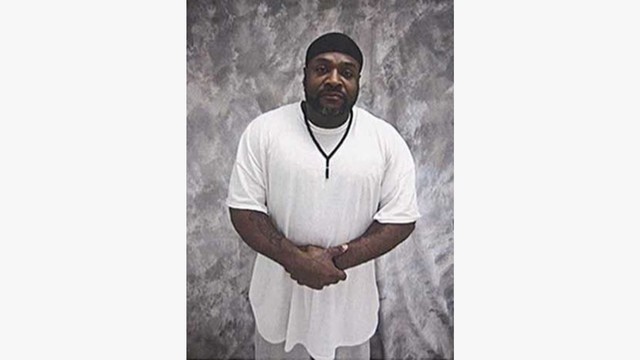
Khalfani Malik Khaldun (Leonard McQuay) is a 49-year-old Black man who was sent to prison in 1987 when he was only 17 years of age, with a 25 year sentence, only to serve 12 ½, then be released back to his freedom.
While serving the 12 ½ years, prison officials served Khalfani with a warrant for murder, saying he was implicated in the killing of a prison officer which occurred on December 13th, 1994. Prison officials immediately sanctioned him to solitary confinement where he had no contact with anyone. He was a target of harassment, torture, racism, and vicious threats on his life. Over a long period of 20 years under the daily threats being made on his life by officers, with very little or no support from the outside, Khalfani began a downward spiral into deep depression, paranoia, panic, and anxiety attacks.
For 6 ½ years his case hung in the balance in Indiana courts, until a trial was set. Khalfani had no legal help, and being in solitary confinement he had no direct access to the prison law library. For 20 years years he was denied access to rehabilitative and quality educational programs.
Khalfani completed 12 ½ years on July 27th, 2000. He went to trial from March 26th to March 31st, 2001, and was found guilty by an all-white jury for a crime he didn’t commit. What should have been his release from prison ended up being a new sentence of 60 years, handed down on April 20th, 2001 by a judge who a year later died of a heart attack.
During the 30 years of incarceration, coupled with being held by Indiana Department of Corrections for 20 of those years in isolation for 23 hours a day, he lost his mother, 3 brothers, and his only son, with whom he never got to spend a day in the outside world. He lost 2 sisters and recently his stepfather, causing him to agonize for years having anxiety, panic attacks, high blood pressure, and psychological anguish. Instead of helping him heal, the IDOC and the mental health department prescribed him pills to control him and provided no real mental health therapy. During his 20 years in solitary confinement he was constantly attacked by racist officers seeking to break his spirits.
During the 30 years of incarceration, coupled with being held by Indiana Department of Corrections for 20 of those years in isolation for 23 hours a day, he lost his mother, 3 brothers, and his only son, with whom he never got to spend a day in the outside world. He lost 2 sisters and recently his stepfather, causing him to agonize for years having anxiety, panic attacks, high blood pressure, and psychological anguish. Instead of helping him heal, the IDOC and the mental health department prescribed him pills to control him and provided no real mental health therapy. During his 20 years in solitary confinement he was constantly attacked by racist officers seeking to break his spirits.
Khalfani's motivation is centered on being released from prison to be united with his grandchildren, his loving daughter, and her mother.
The money we raise will be used to pay an attorney to work on the rightful release of Brother Khalfani Khaldun (Leonard McQuay).
Brother Khalfani is a parent, grandfather, and he has grown up in prison feeling a great responsibility in caring for his relatives, in mentoring youth and building better and stronger communities. He is a warmhearted man with a fighting spirit. He is just the man needed to pull a family together and work for the good of people in the neighborhood. He has strong faith and treats his family, friends, supporters and the wider community well and warmly, despite his terrible situation.
The supportteam around Bro Khalfani has found an attorney who is willing to take his case. For this to happen, we do need to pay a large amount upfront, because this involves a lot of work hours.
If we all donated a few dollars, we would have enough money to hire this attorney to start working on the case. Bro Khalfani is very very hopeful he will gain his rightful release as soon as possible with your help. You can help with giving freedom to this much deserving man, and at the same time you will invest in a community man, a family man and a great supporter of humanity.
If we all donated a few dollars, we would have enough money to hire this attorney to start working on the case. Bro Khalfani is very very hopeful he will gain his rightful release as soon as possible with your help. You can help with giving freedom to this much deserving man, and at the same time you will invest in a community man, a family man and a great supporter of humanity.
Thank you from the bottom of our hearts
On behalf of Brother Khalfani Malik Khaldun,
His support team: Annabelle, Paul, Peter, Nick, Twitch and others!
Facts about Khalfani (Leonard McQuay)’s case:
• In 1994, at the state prison, shortly after the officer was stabbed, officers walked McQuay (Khalfani) through the crime scene, contaminating it. Blood was everywhere.
• In 1994, at the state prison, shortly after the officer was stabbed, officers walked McQuay (Khalfani) through the crime scene, contaminating it. Blood was everywhere.
• Two officers who had been on scene helping the officer into the ambulance and who had blood on their hands took his clothes.
• One small droplet of the officer’s blood was purposefully wiped on the cuff of Khalfani’s pants during his strip search.
• No weapon was ever discovered matching the injuries of the officer, and no knives that were found during the search of the prison cells had the officer’s blood or finger prints on them.
• In 1995, prison officials and medical staff manufactured documents to illegally obtain a DNA sample from McQuay (Khalfani) at Westville Prison.
• Inside the cell McQuay (Khalfani) lived in on the day the stabbing occurred, a bloody fingerprint was discovered on a light switch belonging to an unknown source. This was never pursued.
• His lawyer told McQuay (Khalfani) not to testify on his own behalf. Khalfani now sees that the lawyer mislead him and that he should have taken the stand.
• The initial public defender assigned to his case, attorney C. Price, set the stage for a sure guilty verdict by abandoning the case prior to his first trial date to be the Deputy Prosecuting Attorney in the same office that filed the charges.
After the jury was interviewed, it was discovered that during their deliberations members of the jury made comments about McQuay (Khalfani) not testifying, made comments about his race, and already being in prison, as if they felt he was a trouble maker. They were prejudiced at the beginning.
• We have one juror who is willing to testify that she was pressured to vote to find him guilty. She will testify that she knew it was all designed for him to take the fall for the murder, and that she went to speak to the trial judge to let him know that she was wrong after the trial. He told her, “Go home, it’s too late. It’s over,” instead of ordering a new trial. We will push for a new trial.
• We have a prisoner’s sworn statement declaring that prison investigators tried to coerce them into saying they witnessed the attack on the officer by Khalfani.
• During his trial he was forced to wear an electronic shock belt strapped to his kidney and midsection, causing him to not be effective in communicating to his attorney.
• We have one juror who is willing to testify that she was pressured to vote to find him guilty. She will testify that she knew it was all designed for him to take the fall for the murder, and that she went to speak to the trial judge to let him know that she was wrong after the trial. He told her, “Go home, it’s too late. It’s over,” instead of ordering a new trial. We will push for a new trial.
• We have a prisoner’s sworn statement declaring that prison investigators tried to coerce them into saying they witnessed the attack on the officer by Khalfani.
• During his trial he was forced to wear an electronic shock belt strapped to his kidney and midsection, causing him to not be effective in communicating to his attorney.
Debunking the falsehoods:
• The trial wasn’t fair and impartial. Allowing an all-white jury to be selected to judge the case did violate his right to due process. That was not a jury of his peers.
• The court selected public defender C. Price to defend him initially on the case. Not wanting him to be released on a speedy trial request, this lawyer caused a delay by filing a DNA request. Then he abandoned the case on November 11th, 1998, by joining the Laporte County Prosecutor’s office. He stopped Bro Khalfani from being discharged/released from prison.
• During this period Khalfani was without council and without any say-so in the delays to his trial.
• The court selected public defender C. Price to defend him initially on the case. Not wanting him to be released on a speedy trial request, this lawyer caused a delay by filing a DNA request. Then he abandoned the case on November 11th, 1998, by joining the Laporte County Prosecutor’s office. He stopped Bro Khalfani from being discharged/released from prison.
• During this period Khalfani was without council and without any say-so in the delays to his trial.
• The court abused its discretion when it denied Khalfani’s motion for a mistrial.
• The court abused its discretion when it gave a faulty jury instruction.

No comments:
Post a Comment